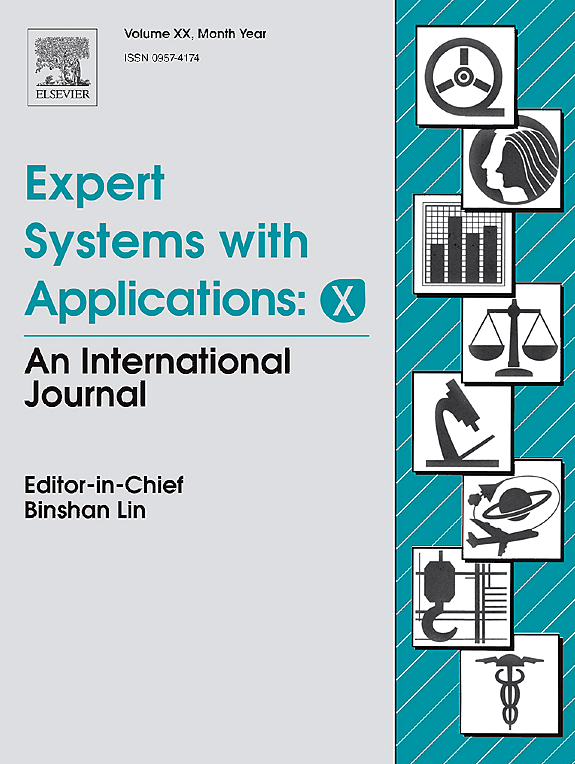Editorial Board & Publication Information
Publisher’s Note
Intrusion detection by machine learning: A review
Exchange rate forecasting using a combined parametric and nonparametric self-organising modelling approach
Fuzzy rule-based analysis of firm’s technology transfer in Taiwan’s machinery industry
A new document representation using term frequency and vectorized graph connectionists with application to document retrieval
An adaptive genetic-based signature learning system for intrusion detection
Evaluation of fuzzy neural network run-to-run controller using numerical simulation analysis for SISO process
Improving the generalization performance of RBF neural networks using a linear regression technique
Towards a hybrid load balancing policy in grid computing system
Landmark detection from mobile life log using a modular Bayesian network model
Fuzzy concrete bridge deck condition rating method for practical bridge management system
A novel ACO–GA hybrid algorithm for feature selection in protein function prediction
A GA methodology for the scheduling of yarn-dyed textile production
Robust adaptive fuzzy logic power system stabilizer
Effective solution for unhandled exception in decision tree induction algorithms
A novel associative memory approach to speech enhancement in a vehicular environment
An intelligent fault diagnosis method based on wavelet packer analysis and hybrid support vector machines
Emerging organizational structure for knowledge-oriented teamwork using genetic algorithm
Gene expression programming based due date assignment in a simulated job shop
Research intelligence involving information retrieval – An example of conferences and journals
A novel self-organizing fuzzy rule-based system for modelling traffic flow behaviour
A fuzzy model for supplier selection in quantity discount environments
Pricing fuzzy vulnerable options and risk management
Toward breast cancer survivability prediction models through improving training space
Location of amide I mode of vibration in computed data utilizing constructed neural networks
Medical knowledge management for specific hospital departments
Multinomial logistic regression and product unit neural network models: Application of a new hybrid methodology for solving a classification problem in the livestock sector
Embedding knowledge exchange and cognitive matchmaking in a dichotomy of markets
Using the artificial neural network model for modeling the performance of the counter flow vortex tube
A modified particle swarm optimization for production planningproblems in the TFT Array process
Online assessment of content skill levels for medical texts
Design of input vector for day-ahead price forecasting of electricity markets
TACO-miner: An ant colony based algorithm for rule extraction from trained neural networks
A source adaptive independent component analysis algorithm through solving the estimating equation
A hybrid multi-criteria decision-making model for firms competence evaluation
Discovering frequent itemsets over transactional data streams through an efficient and stable approximate approach
A hybrid approach based on Hotelling statistics for automated visual inspection of display blemishes in LCD panels
SKU demand forecasting in the presence of promotions
The effect of neighborhood structures on tabu search algorithm in solving course timetabling problem
Data spread-based entropy clustering method using adaptive learning
Design patent map visualization display
A fuzzy modeling method via Enhanced Objective Cluster Analysis for designing TSK model
Short-term fault prediction based on support vector machines with parameter optimization by evolution strategy
A dependency-based search strategy for feature selection
Application of fuzzy cognitive maps for cotton yield management in precision farming
Descriptors for image-based fingerprint matchers
B2 model: A browsing behavior model based on High-Level Petri Nets to generate behavioral patterns for e-learning
Automatic linear causal relationship identification for financial factor modeling
An efficient hybrid Taguchi-genetic algorithm for protein folding simulation
Generation of new service concepts: A morphology analysis and genetic algorithm approach
Two techniques of sensitivity and uncertainty analysis of fuzzy expert systems
An intelligent infotainment dissemination scheme for heterogeneous vehicular networks
An weighted ontology-based semantic similarity algorithm for web service
Generating prediction rules for liquefaction through data mining
A new feature selection method based on association rules for diagnosis of erythemato-squamous diseases
Predicting the Brazilian stock market through neural networks and adaptive exponential smoothing methods
Information inconsistencies detection using a rule-map technique
A multi-disciplinar recommender system to advice research resources in University Digital Libraries
A computational model of an intuitive reasoner for ecosystem control
A genetic network programming with learning approach for enhanced stock trading model
Customer churn prediction by hybrid neural networks
A virtual metrology system for semiconductor manufacturing
Identifying target green 3C customers in Taiwan using multiattribute utility theory
Supply chain network design using an integrated neuro-fuzzy and MILP approach: A comparative design study
The forecasting ability of Internet-based virtual futures market
An incentive pay system for project management based on responsibility assignment matrix and fuzzy linguistic variables
Fault-tolerant control of three-pole active magnetic bearing
Exploiting knowledge ontology and software agents for PPI network analysis
Modified diffusion model with multiple products using a hybrid GA approach
An economic design of double sampling X¯ charts for correlated data using genetic algorithms
Corrigendum “Recommender system for software project planning one application of revised CBR algorithm” [Experts Systems with Applications 36 (5) (2009) 8938–8945]
Corrigendum “Fuzzy set theory in managerial contract analyses” [Experts Systems with Applications 36 (3P1) (2009) 4535–4540]


